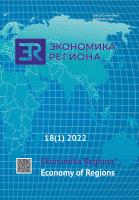Palm Tree Plantation as a Panacea for Poverty and Unemployment Reduction
in South-Western Nigeria: A Review
Palm Tree Plantation as a Panacea for Poverty and Unemployment Reduction
in South-Western Nigeria: A Review
Author(s): Yusuff Jelili AmudaSubject(s): Economy, Agriculture, Energy and Environmental Studies, Socio-Economic Research
Published by: Институт экономики Уральского отделения Российской академии наук
Keywords: Palm Tree; Plantation; Poverty; Unemployment; Land Protect Act (LPA); Nigerian Palm Plantation Development Act (NPPA);Infrastructural Development;
Summary/Abstract: Nigeria as a nation is endowed with both human and natural resources. These resources are enough to solve multifarious challenges such as poverty and unemployment. Unfortunately, the issue of poverty and unemployment in the country receives insufficient attention instead of being the government’s foremost priority in the recent time. Little attention is also paid to the exploration of palm tree plantation as a way forward for addressing the challenges of poverty and unemployment in the country. The present paper reviews literature that investigated palm tree plantation as a remedy to endemic or abject poverty and unemployment in the country. The conceptual framework is used to explore the significant impact of palm tree plantation on poverty and unemployment reduction in the country. The methodology of content analysis of relevant literature was applied. The research results indicated that there are potentials to be tapped in palm tree plantation as a solution to the prevalent poverty and unemployment in the South-western part of the country. The findings reiterated that palm tree plantation can make an essential contribution to the development of infrastructure such as roads, schools, and telecommunications among others. The paper revealed that there is a relationship between palm tree plantation and poverty and unemployment reduction in the South-Western Nigeria. However, the study also identifies the effect of palm cultivation, especially its impact on tropical rainforests. It is thereby suggested that palm tree plantation should be included as part of social intervention programmes. In addition, the government should constitute the Nigerian Palm Oil Board (NPOB) and initiate the Nigerian Palm Plantation Development Act (NPPA) in order to expand the agricultural investment in the country. It is further suggested that palm tree plantation should be used for infrastructural development, such as roads, schools, telecommunications etc. Lastly, Land Protect Act (LPA) should be effectively formulated and executed for safeguarding the socio-environment degradation emanating from palm tree plantation.
Journal: Экономика региона
- Issue Year: 18/2022
- Issue No: 1
- Page Range: 21-30
- Page Count: 10
- Language: English

